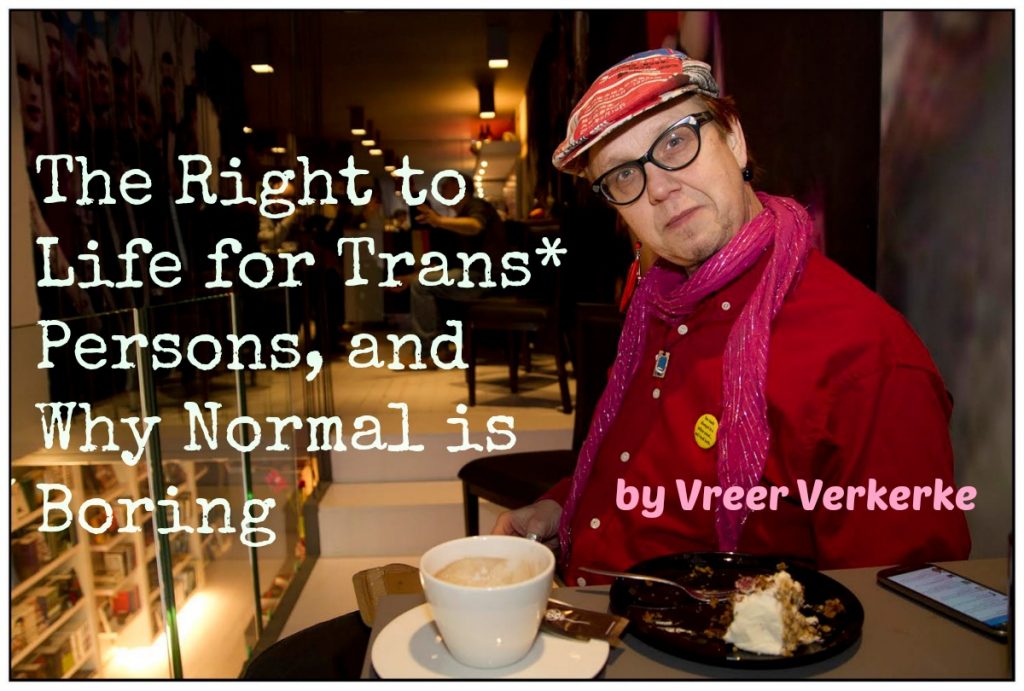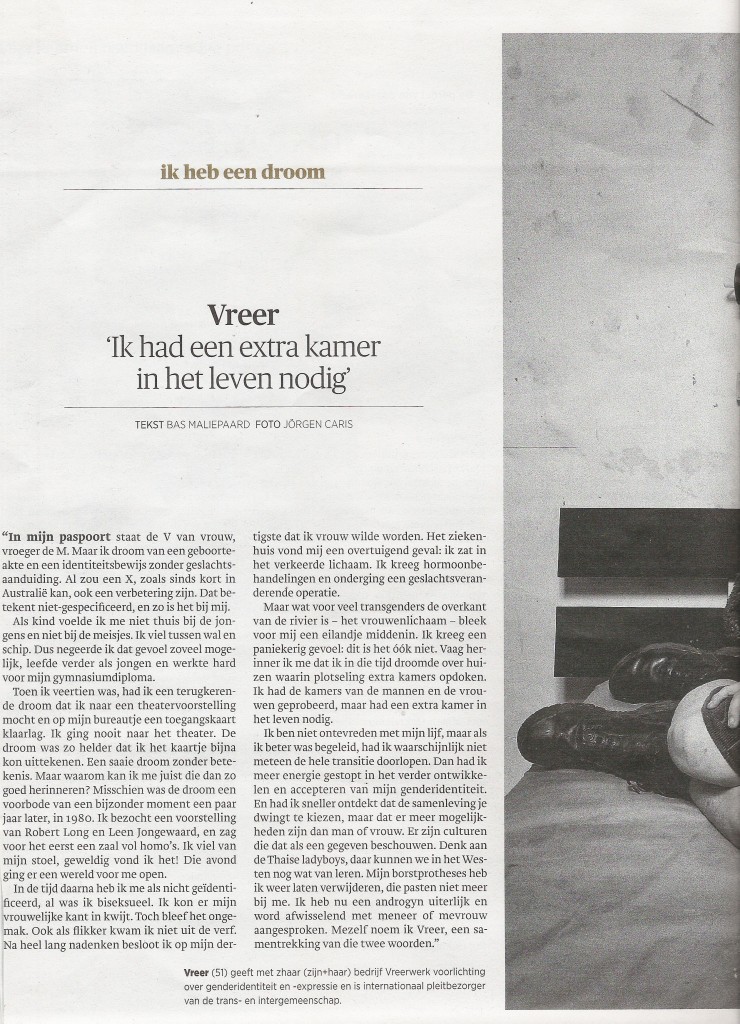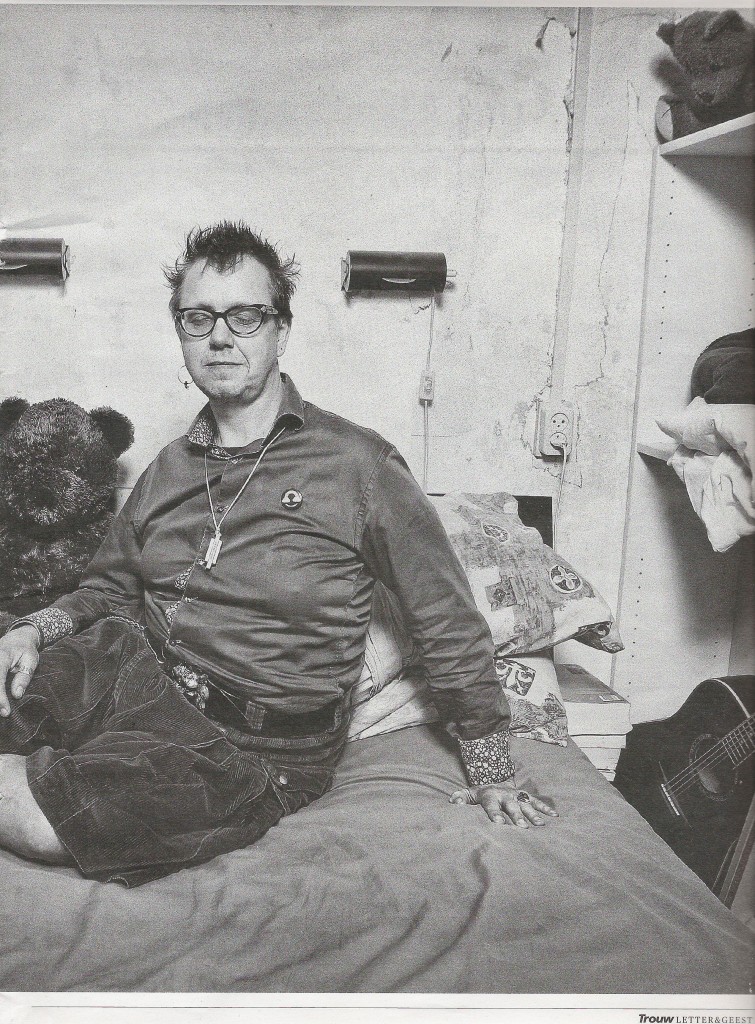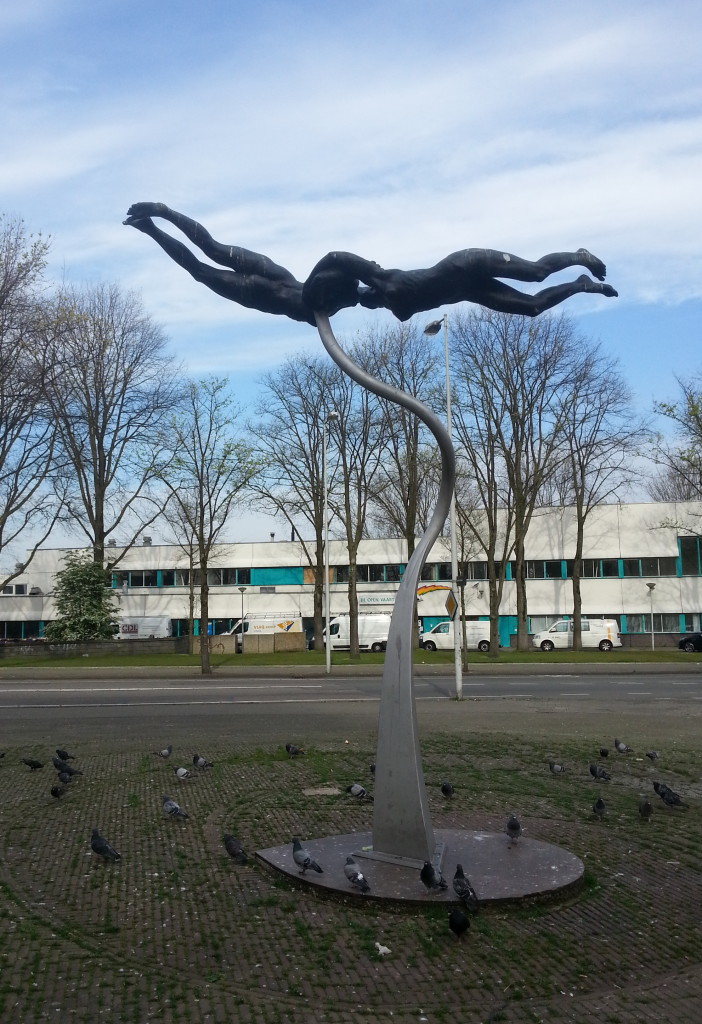I have been asked by Dara Hoffman-Fox to write a piece for her site as a genderqueer gender educator and human rights advocate for the rights of trans* and inter* people. And I gladly comply with her request.
[Before I continue, a short orthographic notice: I write “trans*” and “inter*” without meaning to refer to a footnote, but the asterisk implies the vastness of trans and inter(sex/gender) identities and expressions.]
Dara’s eyes fell on this part of the vision page on my professional website:
We aim to break through (apart?) stereotypes around gender, gender identities and gender expressions. This goes for both trans people and non-trans people. The cisgendered (i.e. non-trans) are also entitled to be free from stereotypes about their way of life. We do this through gender education.
This Thursday trans* people and friends, partners, allies all over the world will pay attention to Transgender Day of Remembrance. This day started 16 years ago in a reaction to the murder of Rita Hester from Allston, MA.
As still is the case in the United States (10 killings this year), and in Brazil (the country with again the highest count of trans* murders with 113 this year) most victims of murders are black trans* women of African-African heritage, which makes this, apart from a gender issue, also a race and class issue.
Transgender Europe’s Trans Murder Monitoring project counted 226 killings worldwide this year only. Since the start of the project in 2008 we have counted 1,612 murders against trans* people. The Americas are the most dangerous place to live for trans people, surely for trans* people of color. This year 176 killings, with high proportions for tiny countries as Honduras (10 people). But also the Netherlands knows a trans related killing this year.
For trans* people, nowhere is really safe.
The Western societies we live in and its influence sphere have a political and economic system that systematically favors white (middle and upper class) heterosexual cisgender men. All cis men in the end. But also cis women. Think of the incident in the Baltimore McDonald’s where a trans woman was heavily attacked by a group of cis girls.
Women, cis or trans or intersex suffer under this patriarchal system. We trans* and gender-non conforming people are the first ones cis male anger is taken out at. That is criminal and against all human rights, amongst which the most basic one: The right to life. The system creates specific forms of masculinity and femininity and thinks trans* people have no place in that.
There are, however, possibilities to make life for trans* people easier. On the legal front slowly we are getting to possibilities for gender recognition without the need for medical intervention. And several health clinics over the States provide services to trans* people without the need of a pathologizing mental health diagnosis of “Gender Identity Disorder” (DSM-IV and ICD-10) or “Gender Dysphoria” (DSM-5). Health centers like of Callen-Lorde in New York City, or Howard Brown in Chicago, or Tom Waddell in San Francisco.
As trans* people we are very often frowned upon and people have absolutely no clue about us, our lives, our joys and our issues. Helped by crazy sensational TV programs or impertinent questions by many other talk show hosts we are the gender weirdos. Living la vida loca. Prejudice and lack of knowledge. If we could, we would for sure. Even for well off trans people life isn’t ideal.
And as a non-binary trans person (a “Nobi,” as I call it) I have more and more trouble in understanding all those normatively gendered people. Personally I have lost my gender ages ago and I am not really inclined in finding it again. I am a happy multiple/multi-gender.
On good days I can be fascinated by how the “normal” people do. Gender stereotypes – the way most “men” or “women” behave – are fascinating. If you’re not confronted by them. If the normatively gendered people don’t bother you for going to the wrong bathroom or looking too male for a woman, being too much a sissy for a “Real Man.”
I guess my being different makes me great for educating people on gender diversity. I see all those weird gender expressions by the majority of people and can explain our “weirdness” to the normal people. Because gender stereotypes are nasty things everybody suffers from. Even – and mostly – for those enforcing them. Because they miss out a whole lot of opportunities for more (gender) freedom. Sometimes I feel so sorry for them. Not sure they care, but still.
Cis and trans* women know quite well what it is to live under gender stereotypes. Cis women are to marry and take care of the kids. Sexual and reproductive autonomy is not accepted. Of course there are lovely cis men (even straight ones!). Only, in the morals of power, women’s autonomy is heavily fought over. Abortion clinic after clinic is forced to close, because the idea that a woman has a choice over her pregnancy is anathema.
Many times trans* people will have to comply to a similar moral scrutiny and only if you are “really” a woman and thus willing to sacrifice your fertility then you are allowed to change the gender marker on your birth certificate and their ID papers.
So yes, surely trans* people actively suffer under gender stereotypes and we shouldn’t. The situation is partially better with you in the USA, partially way worse. Not that The Netherlands or Western-Europe for that part is even remotely near trans* heaven. Trans* utopia is nowhere, not even in Argentina with its great legislation.
I feel a bit sorry for complaining so much, instead of immediately bringing you the Gleeful Gender Gospel. There is so much trouble and it so strongly interconnected, that I have to pay attention to it.
But as I say, the non-standard life, being gender non-conforming can be great. And the good news to the cis people over here is: you don’t have to become trans*. Usually I really advocate for people to become trans, to really change their gender identity and gender expression from the one belonging to the gender they have been assigned a birth to something completely different. It can be a great time. Like the book Dick For a Day in which the (female) authors fantasize what they would do if they had one.
But you don’t have to. Secretly we are pretty happy to be exceptional, to be “living la gender loca,” so to say.
In my workshops I dissect the working of gender norms, how they are very productive in enabling only certain gender roles and identities and how others are then violently or friendly.
Dear cis people, open up, be straight but not narrow. Really, being a soft open-minded man who understands his own feelings and that of others, who can deal with emotions in a sensible way, is more an asset to a better world and to better relationships than you may think.
You have got nothing to lose but your gender chains.
People (sensible people at least) will love you. Prissy peers may not, they may try to keep you inside the snake pit, but that has to do with your leaving the group, breaking group discipline or doing what they don’t dare to do. The problem with group culture often is that it only works with group discipline. Find yourself a best friend, of whatever gender, to support you.
You don’t have to become trans* to change your gender. Look at the Gender Identity Map from the Impact Project. There are so many possibilities for gender identity and expressions…No need to stick with what you learned in school or from your peers.
There is life out there. Don’t despair.
My biggest complaint around standard gender expressions and people living them is that it is so utterly boring. Who the hell wants to be a healthy, organic whole when you can be a brilliant, injured fragment, after all. This whole investment in wholeness, the whole expectation of living neatly in boxes (even round ones) so doesn’t comply with my jumpiness. I consider it so unhealthy.
Yes, I can associate healthiness etc. in a positive sense. Of course. But not default lives. Default lives are – on the political level – bad and dangerous. They are responsible for the zillions of trans related killings. Fitting in is unhealthy. But falling out may be dangerous.
The forces of normality are strong, the need to find your own way is bigger.
So here’s to the crazy ones, with their shiny gender and their sparkling identities. May we live long and prosper. With lovely, friendly cis people who love us dearly and don’t invest so much in being “normal.”
Author Bio
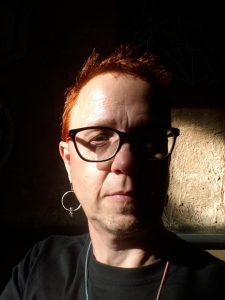 From the perspective that there are more than two sexes and more than two genders, that being trans or gender-non conforming is diversity instead of an aberration, Vreer Verkerke of Vreerwerk does gender education and human rights education with students, sex educators, lawyers, politicians in The Netherlands and beyond.
From the perspective that there are more than two sexes and more than two genders, that being trans or gender-non conforming is diversity instead of an aberration, Vreer Verkerke of Vreerwerk does gender education and human rights education with students, sex educators, lawyers, politicians in The Netherlands and beyond.
